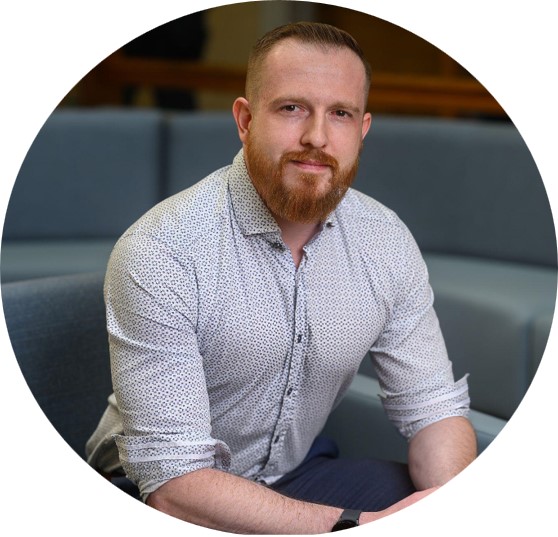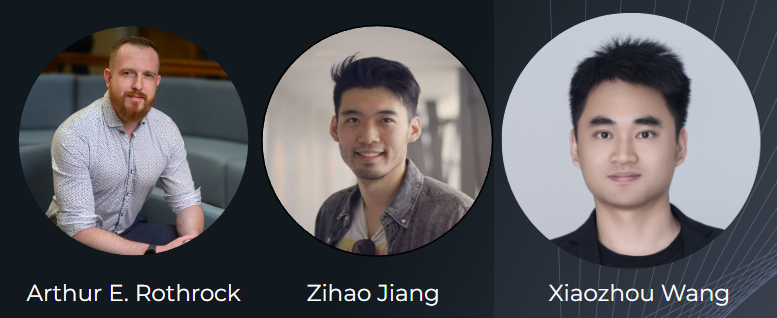 Santa Clara Law alum Arthur Rothrock J.D. ’16, returns to Santa Clara University as a part of the Bronco Ventures Accelerator to launch his startup, Legion LegalTech Corp., which can already auto-draft complex litigation documents in minutes (website: Legion.law).
Santa Clara Law alum Arthur Rothrock J.D. ’16, returns to Santa Clara University as a part of the Bronco Ventures Accelerator to launch his startup, Legion LegalTech Corp., which can already auto-draft complex litigation documents in minutes (website: Legion.law).
“I’ve always been a giant science fiction nerd, and I love innovation. I built my own PC with my dad when I was like 11 so I started tinkering with new tech very early on,” commented Rothrock.
Legion’s system can draft pleadings, discovery requests and objections, motions, oppositions, their supporting documents (notices, declarations, separate statements, proposed orders), and more.
Rothrock explains that Legion’s system is much like having an extra associate or paralegal. “What we give you back is something that is 80 to 90 percent of the way there, so that then you can add your own personal touch and take your document to the finish line.”
Rothrock noted that technology is what drew him to Santa Clara University in the first place.
“I got into VR, cryptocurrency, 3D printing – all of that cool tech – and Silicon Valley was the hub of it… I knew that’s where I wanted to be, because that was where people were building the future,” explained Rothrock. “Santa Clara [Law] was right at the heart of it, and all of the high-tech coursework that they offered was excellent. I took courses in venture capital, IP litigation, tech licensing; I learned all of the practical skills that you could possibly want working out here with companies or litigating on their behalf.”
“Santa Clara Law definitely gave me the network to really get [Legion] off the ground,” said Rothrock. He notes that his story is full of Santa Clara Law alums who supported his mission, and his company. Many alumni were Legion’s first customers and others helped Legion with their corporate formation, privacy policies, terms of service, trademark protection, and more.
“Thiadora Pina was a professor of mine, and she pointed me to Sharine Xuan, another Santa Clara Law alum, who founded the Elevate Community Center, now one of our first nonprofit partners.”
Rothrock also highlighted Pam Vavra, a key supporter of Santa Clara Law’s Entrepreneurs’ Law Clinic, who is now supporting the Bronco Ventures Accelerator.
The Bronco Ventures Accelerator (BVA) empowers Santa Clara University entrepreneurs with the tools, accountability, and community to develop and grow for-profit businesses with competence, conscience, and compassion.
Rothrock met Zihao Jiang online through Reddit, a JD/MBA grad turned startup operator, and explained his idea for using AI to draft legal documents. Two weeks later, Rothrock got a call. Jiang had built the idea for Stanford’s LLM x Law Hackathon. Jiang flew in from Toronto to join Rothrock in Silicon Valley where, together, they presented the idea at the hackathon and were selected as finalists. Back in the motel room and with the idea validated, they decided to found Legion.
Jiang added, “I’ve been searching for use-cases for [Large Language Models] for a while. I went to law school in Toronto, Canada, and even though I never practiced as an attorney, I’ve always had sort of a soft spot for the legal industry.” With his unique background, Jiang bridges the gap between Rothrock and their tech team.
Jiang and Rothrock acknowledge that AI can “hallucinate” or generate inaccurate information, a problem highlighted by the ChatGPT lawyer incident in which a court sanctioned an attorney for citing non-existent cases provided by ChatGPT. Rothrock points out that this incident highlights a fundamental misunderstanding of the capabilities and limitations of large language models (LLMs). Legion, he says, is built to lean into the strengths of AI while leaving tasks that require more human judgment, like legal research, strictly to attorneys. Legion mitigates the danger of hallucinations by implementing strict guardrails and internal human review to prevent inaccuracies in their AI system. Rothrock believes this approach is vital for making generative AI practical and trustworthy in the legal sector.
Legion’s vision for the future of legal practice is one where AI empowers attorneys to focus on the most meaningful aspects of their work. While some fear that AI may replace attorneys, Rothrock believes it will enable a more human-centric approach to practicing law. By leveraging AI to handle tedious drafting tasks, attorneys can achieve a better work-life balance and reduce stress, rather than burning the midnight oil. Furthermore, as AI makes litigation more affordable, it will help bridge the access to justice gap, allowing more people to receive the legal support they need. With a shortage of attorneys relative to the demand for legal services, increasing the capacity of practicing lawyers is a no-brainer. However, AI will never replace an attorney’s judgment and the personal connections they build with clients. Ultimately, everyone benefits from this technology.
Rothrock’s law firm, Rothrock Legal, is testing this vision with a first-of-its-kind hybrid hourly and per-page business model alongside Legion to show attorneys that a tech-assisted law practice of this kind is not only possible but to their advantage. By using AI and charging per page, Rothrock can take on more clients and offer a lower billable rate. Rothrock also notes, “Legion gives me a huge litigation advantage in that I can go on the offensive quickly with discovery, ex partes, and motions to keep the other side off balance.”
“I didn’t really go to law school with the mindset that I would found a company, but both my parents were small business owners so it was never really out of the question. If they could do it, I knew I could too, I just needed the right idea. The idea of Legion really was born from one of my character flaws: I loathe boring, tedious work and often spend more time looking for novel ways to complete the work more efficiently than if I had just sat down and done it the old-fashioned way from the start. Why walk down to the river with a bucket for water when I can spend an inordinate amount of time constructing an elaborate series of pipes to bring the water directly to me? This mindset can understandably annoy employers who just want you to go down to the river and haul water, but this mindset really lends itself well to entrepreneurship and technological progress. And that’s what happened with Legion. Legal work is rife with tedious tasks that get left out of TV shows for obvious reasons. My initial frustration with this tedious work and desire to do less of it ultimately is what led to the creation of Legion.”
Attorneys interested in what Legion is up to can check out Legion.law and book a demo. In parallel to Santa Clara Law’s mission of practicing law with compassion, Legion also offers their services at a discount to legal aid nonprofits to support those unable to afford legal services. Legion LegalTech, Corp. is led by Arthur Rothrock (CEO), Zihao Jiang (COO), and Xiaozhou Wang (CTO).
